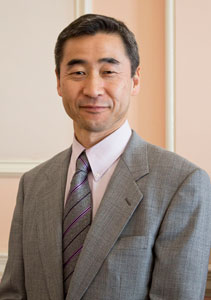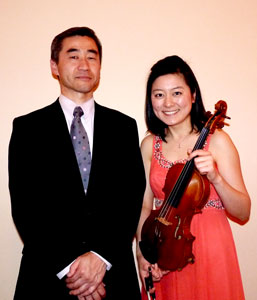Mr Noda served as Minister and Consul General in London from August 2010 and became Minister Plenipotentiary in January 2011.
|

|
1. What impact did the Great East Japan Earthquake of 11 March have on your work?
As in other Japanese missions around the world, we at the Embassy in London became incredibly busy from the moment the disaster struck in communicating with the British Government and numerous other organisations in both the UK and Japan concerning the provision of aid to Japan and supporting the victims. Starting with the arrangements for the departure and the arrival in Japan of a British search-and-rescue mission on the day following the earthquake, all the staff of the Embassy became involved in responding to the offers of assistance and enquiries about the safety of individuals from both countries as well as about the situation at the Fukushima Daiichi Nuclear Power Plant.
As covered in the Special Edition No. 2 of the March Webmagazine, I joined in welcoming back the members of the search-and-rescue team at Manchester Airport about a week later, and this experience left a strong impression on me. I was really amazed by the tenacity and dedication of each team member who had just finished their stint in the devastated areas. In fact, I almost hugged the two adorable but capable rescue dogs, which had gone through so much difficulty.
|
Ever since then, there has been a succession of charity events, of which Embassy staff members have attended as many as possible.
2. What are your impressions of the charity events?
Let me first mention that, even apart from the dispatch of the search-and-rescue team, the British Government has expressed its concern and extended assistance in various other ways. We very much appreciated the fact that Their Royal Highnesses The Duke and Duchess of Gloucester, on behalf of Her Majesty The Queen, Prime Minister David Cameron, Foreign Secretary William Hague and many, many other people visited our Embassy and signed the Book of Condolence soon after the disaster.
Then, after the first few days, an almost non-stop period of charity events began. We have been allocating different members of the Embassy staff to attend these events so as to maximise the representation of the Government of Japan on these goodwill occasions.
There have been far more of these events than one could have imagined – certainly at least 150, just counting those of which I am personally aware. Many of them have been very moving, I have attended functions involving businesses, musicians, artists, churches, schools, foreign embassies and think-tanks. For instance, there have been cases where musicians and dancers took nothing from the entrance charges to their performances, which can be quite substantial, so that all of the contributions from those attending could be sent to the stricken areas. There have also been instances where school pupils’ modest contributions were matched by the schools themselves and sent to the victims, as well as churches which organised special collection boxes at the end of their Sunday services and passed the proceeds to the Embassy. In addition, there must have been countless other events that we do not even know about.
The earthquake and tsunami were, indeed, extremely tragic. However, given that this disaster is a fact already, we can at the same time observe that it also led to us encountering many people whom we would not have met otherwise. I do not believe that the Embassy can ever express sufficient appreciation for the compassion and concern demonstrated by the British people towards Japan. We should never forget the warm help offered when it was truly needed.
At the same time, I feel this situation is proof of the solid ties that Japan and the Japanese community here have built up with the UK over the years as well, and I am very grateful for the past efforts of the Japanese residents of the UK and for those of our predecessors at the Embassy.
Naturally, the Embassy will do everything it can to assist in charity events. We have extended official support status for a considerable number of them, and we are helping to promote the events in the UK by running the Japan-UK Events Calendar on the Embassy website. There are also some events where the Embassy itself is centrally engaged, such as a charity bazaar due to take place on 11 June. I am sure that, with many people offering their help, this event will be successful.
|
3. In the light of your experience with the recent disaster, is there anything you have learnt concerning emergency response or disaster management?
As I was physically far away from where the disaster struck and in view of its unprecedented scale, I do not think I can point to any concrete lessons learnt by me personally as regards avoiding the disaster or ameliorating the situation in the immediate aftermath. At the same time, I daresay many people will agree with me that, having faced a natural disaster of this magnitude, we should never underestimate the power of nature. Moreover, even when it is difficult to manage or alleviate the situation, it is incumbent upon us to disseminate the relevant information with the utmost transparency and urgency.
4. Considering your previous experience as Consul General, could you tell us about the response of Japanese residents of the UK to the disaster?
|
|
 |
Minister Noda with violinist Lisa Ueda at her charity recital ©the Daiwa Anglo-Japanese Foundation
|
Not surprisingly, during the first few days the enquiries we had from Japanese residents were mainly concerned with the safety of family members and acquaintances in the affected areas. Very soon after that, however, I was most impressed to learn that many people in the Japanese community here had also started looking for ways in which they could help. I have referred to the charity events organised by British people to raise assistance for the victims, but many Japanese, either on their own initiative or in cooperation with British friends and colleagues, engaged in similar activities. There are examples of mothers and young pupils as well as university students arranging charity events. The Embassy, responding to suggestions that it should accept donations, took on this role, and so far the warm thoughts of so many people have been translated into a sum of over £400,000. Contributions from these funds are regularly sent to the devastated areas via the Japanese Red Cross. I would like to thank the members of the Japanese community here for their tremendous goodwill and enthusiasm.
5. Could you give us an overall account of your previous work here as Consul General?
There is a long- and widely-established Japanese community in the UK and it is an important part of our work to extend assistance to its members. The Embassy’s duties in this field range from everyday things such as dealing with passports, visas and identity documents to assisting with matters to do with schools, the Japanese cemetery, immigration issues and residence permits together with helping to keep Japanese citizens safe from crime and accidents and extending help to Japanese businesses in the UK.
In general, my impression is that the Japanese community participates in and contributes to British society in quite a respectable manner. In fact, it might be the case that the Japanese community has tended to be less visible because of this. The Embassy and Consulate General could perhaps do more to make the role and contribution of the Japanese community more visible in British society.
6. How do you like to spend your free time? Is there anything you particularly enjoy about being in Britain?
Unfortunately, so far my work has kept me busy even at weekends. Apart from going to Tesco or Sainsbury’s to do the weekly shopping with my wife, playing tennis with my son in an effort to get a minimum of exercise or practising something on the piano to slow down my physical and mental ageing process, I have not yet been able to do much to deepen my understanding of the UK. One small pleasure I might mention at this stage is afternoon tea. When one considers the quality, quantity and sheer variety of ingredients involved, I really enjoy taking afternoon tea as a sort of substitute for lunch. I think it is something that need not be restricted to the UK but should be popularised around the world.
Of course, now that we are being blessed with pleasant weather, my family, including our daughter, who is supposed to visit here from Tokyo during the summer recess from her high school, is looking forward to visiting many parts of the UK in the coming months and really getting to know this beautiful country. |
|

